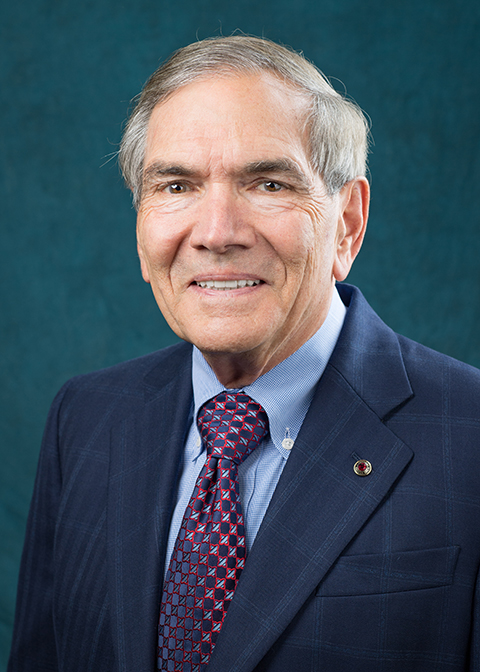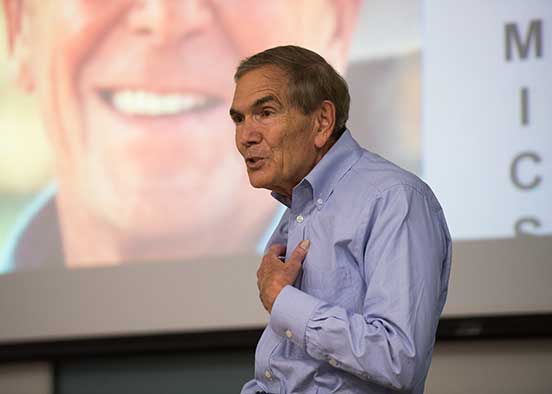Codeine is a well-known opioid pain reliever.
But what, you might ask, is a co-dean?

Longtime healthcare administrator Jim Nathan thinks it’s more than a play on words.
“Codeine is used to relieve pain, but if you take it too long, it becomes addictive,” he says. He believes a co-dean may produce much the same effect.
Pun aside, co-dean was the original title of the position to which the retired Lee Health CEO was appointed last fall in Marieb College of Health & Human Services. The title was recently modified to co-acting dean, a title he shares with Shawn Felton, to give it a bit more gravitas.
The two men, both longtime healthcare professionals and teachers, have teamed up to help Marieb College assess its strengths and challenges as the university’s new provost, Mark Rieger, steps into his job and faces the task of hiring a new permanent leader for the college.
“Jim came in to provide an outside look at the organizational structure,” says Felton, a longtime health sciences professor, former chair of his department and former Faculty Senate president. “Having a fresh set of eyes is a great thing. He went on a listening tour to make sure there was nothing systemic wrong. He is a trusted individual with proven leadership skills, having run a large organization, he was available and he loves FGCU.”
Nathan and his wife, Karen, were spending time in North Carolina last year “with the squirrels and raccoons and bears and turkeys and foxes, pretty much social distancing, then thinking it was starting to get cold,” Nathan says, when he got a call from FGCU President Mike Martin asking if he would serve as interim dean of Marieb College.
“It was hard to say no,” Nathan says. His reply to Martin was, “’I’m happy to help but I need to have a partner, someone who understands the university bureaucracy and day-to-day stuff.’”
Felton handles the day-to-day operations while Nathan tackles strategic planning, cultural and operational barriers, or, as he describes it, “some of the big-ticket challenges.”
Nathan is well-known in Lee County – and beyond – for his managerial acumen and his ability to grow Lee Memorial from one hospital into the county’s comprehensive health-care provider.
“Jim speaks from the heart,” Felton says. “He has the ability to listen and then to summarize what he heard. It’s a phenomenal skill.”
Nathan began by interviewing faculty members individually – about 85 of them – to understand their concerns, perspectives and opportunities.

“My focus has been on really understanding the strengths of Marieb, the faculty’s perceptions of
opportunities for the future, the resources they feel they need to have to strengthen scholarship and research and prepare to engage the new provost in discussion on long-range planning.”
Because health professions students require so much clinical supervision in addition to classroom instruction, many professors find it difficult to conduct research, something that is considered a primary part of a faculty member’s job.
“It’s an additional pressure,” Nathan says. “How do you do it effectively in a university that’s not an R1 (primary research university) with teaching assistants, lab assistants, research facilities?”
And while some professors may excel at research, they might not be as skilled at writing or analyzing data. Perhaps putting together teams that can employ each person’s strengths might be an effective strategy.
Nathan sees a lot of possibilities but wants to ensure that no one loses sight of the college’s great success in educating tomorrow’s healthcare professionals. He shares how impressed he is with the talent and outcomes of the education and training provided and how well they adjusted to the sudden pandemic onslaught.
The goal is to be able to present the challenges and some possible solutions to the provost as the university’s chief academic officer so that he can make decisions that will benefit the students, faculty and, ultimately, the community.
It’s much the same philosophy Nathan employs in teaching his Marieb College class, “Healthcare from Economic, Social and Political Perspectives.” It’s the fourth time he’s taught the class and he finds it deeply fulfilling.
“I love what I’m doing,” he says. “I try to help students realize a teams-based approach is essential for the future of our society. They are learning how to listen to each other, to compromise, to collaborate, to have discussions about difficult issues without shutting down and to be a part of that journey of finding compromises that aren’t perfect but move complex challenges toward improvement.”
The conversation isn’t limited to healthcare. The class also deals with the environment, transportation and the widening gap between the haves and the have nots.
Today’s students were born right around the time of the terrorist attack on 9/11, and “their formative years were in families affected tremendously by the Great Recession,” Nathan says. “They were coming of age during the Great Recession followed by major federal tax cuts resulting in less resources for social human service funding when there weren’t enough before. Now we’re in COVID and the economic and support gap has widened even more. Their lifetimes are not the same lifetimes we had, but they are resilient and the leaders of tomorrow.”
So, while he helps mold the futures of up-and-coming healthcare professionals, he continues to work on identifying what will help the healthcare faculty find fulfillment and job satisfaction as well.
“As soon as Dr. Rieger has an idea for the longer term, I can complete the projects I’m working on,” he says. “Hopefully by the end of April, we’ll be pretty well settled. And Karen and I can go back to the mountains” – ending the term of the co-dean with a good outcome and no addiction.